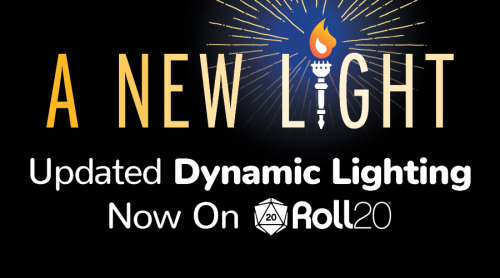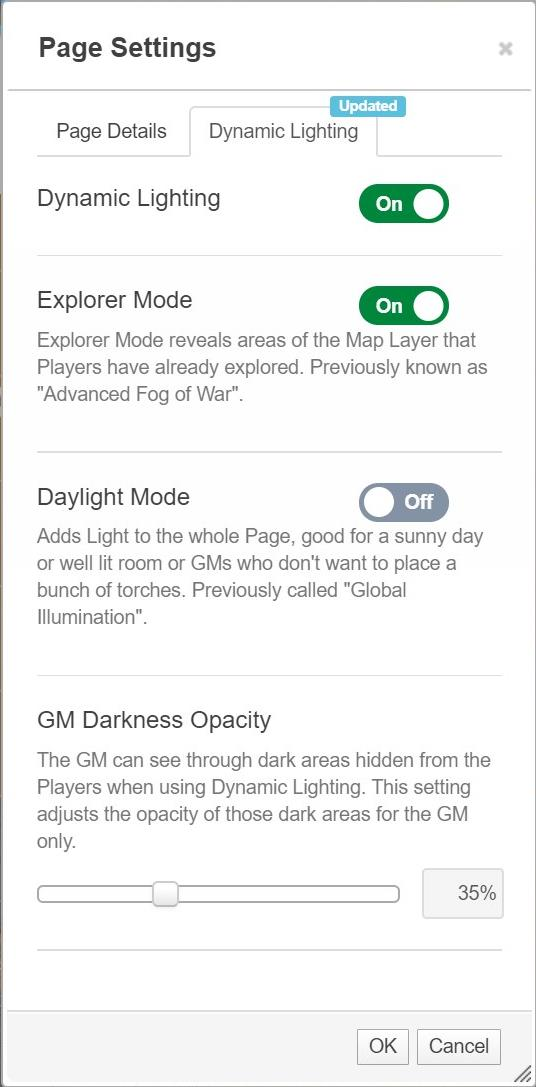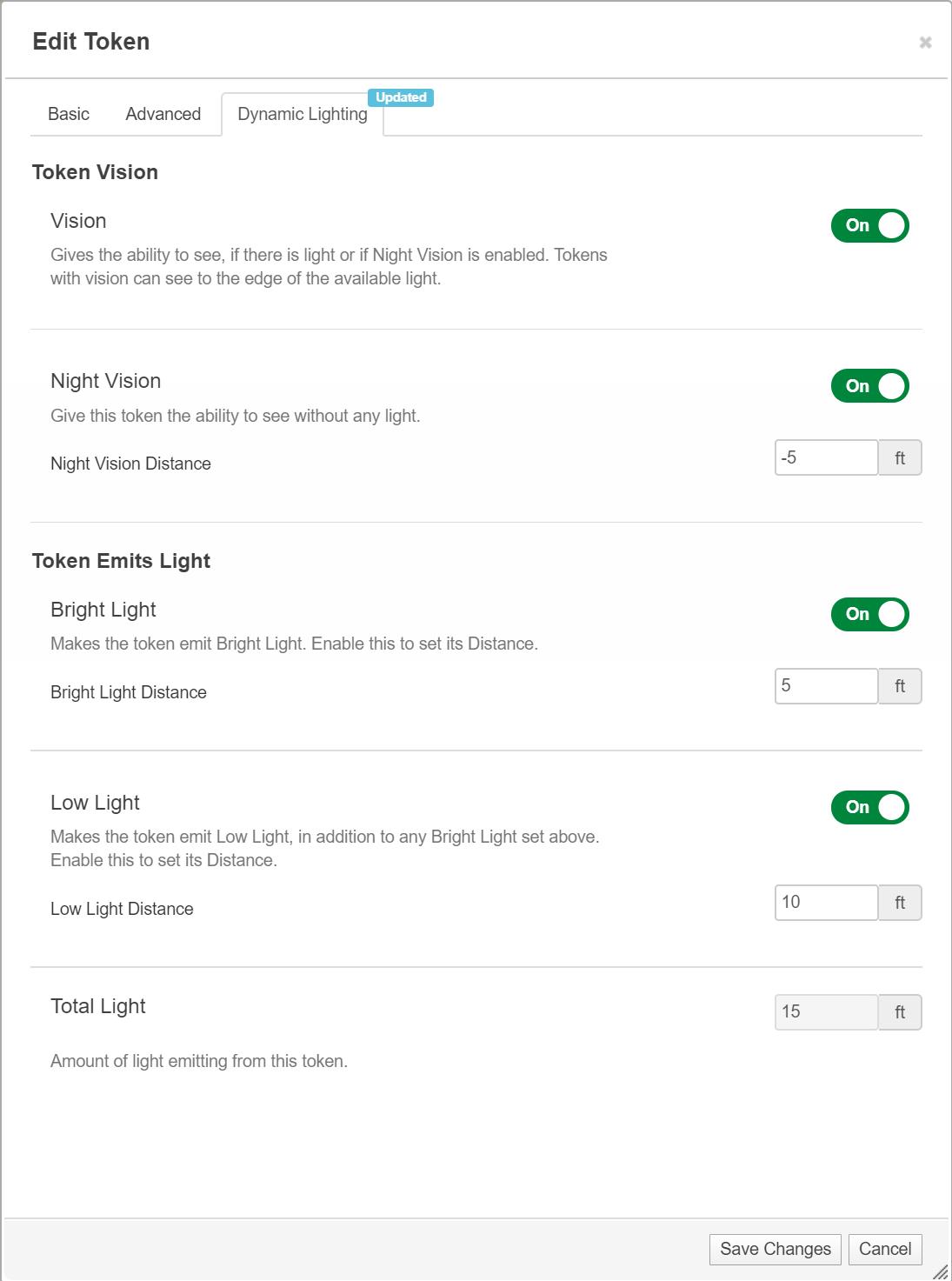Difference between revisions of "Updated Dynamic Lighting"
From Roll20 Wiki
Andreas J. (Talk | contribs) (expand sections) |
Andreas J. (Talk | contribs) m |
||
| Line 7: | Line 7: | ||
In UDL, the old features of '''Advanced Fog of War''' have been renamed '''Explorer Mode''' to avoid confusion. Updated Dynamic Lighting uses WebGL, which is available in most computer systems and is supported by all the web browsers that Roll20 supports (Chrome and Firefox). The [[Legacy Dynamic Lighting]] has always used WebGL, so the change here is that Explorer Mode (previously Advanced Fog of War) now runs on the same system. | In UDL, the old features of '''Advanced Fog of War''' have been renamed '''Explorer Mode''' to avoid confusion. Updated Dynamic Lighting uses WebGL, which is available in most computer systems and is supported by all the web browsers that Roll20 supports (Chrome and Firefox). The [[Legacy Dynamic Lighting]] has always used WebGL, so the change here is that Explorer Mode (previously Advanced Fog of War) now runs on the same system. | ||
| − | On '''January 14th, 2021, Roll20 announced | + | On '''January 14th, 2021, Roll20 announced {{blog|640321601818198016/updated-dynamic-lighting-10-is-live Update 1.0}}''', saying that ''"Updated Dynamic Lighting has been in the works for some time, and we see the 1.0 Update not as a finish line, but a checkpoint."''. Despite this, there exists still multiple known issues, such as performance issues, and visual glitches relating to Darkvision. |
With '''Update 1.0''', they also emphasized that ''"We will still support Legacy Lighting for a while, but we feel it’s only fair to let you know that'' '''we will be deprecating our support for the Legacy system sometime in the future'''. ''"'' No timeline for phased out [[LDL]] was announced. | With '''Update 1.0''', they also emphasized that ''"We will still support Legacy Lighting for a while, but we feel it’s only fair to let you know that'' '''we will be deprecating our support for the Legacy system sometime in the future'''. ''"'' No timeline for phased out [[LDL]] was announced. | ||
| − | Roll20 have said that we will get '''at least''' three months' notice before [[LDL]] is removed. | + | Roll20 have said that we will get '''at least''' three months' notice before [[LDL]] is removed.{{source|https://app.roll20.net/forum/permalink/9713101/}} |
==Official Documentation== | ==Official Documentation== | ||
| Line 115: | Line 115: | ||
<br> | <br> | ||
<br> | <br> | ||
| + | =Refrences= | ||
| + | <references /> | ||
[[Category:Docs]] | [[Category:Docs]] | ||
[[Category:Dynamic Lighting]] | [[Category:Dynamic Lighting]] | ||
[[Category:UDL]] | [[Category:UDL]] | ||
Revision as of 18:33, 31 January 2021
| This is about a Roll20 feature exclusive to Pro-subscribers (and often to players in a Game created by a Pro-subscriber). If you'd like to use this feature, consider upgrading your account. |
| This feature is under active development, so both the community wiki and the Help Desk documentation might lag behind the latest features a updates Andreas J. (talk) 13:43, 18 January 2021 (UTC) |
Updated Dynamic Lighting (aka. UDL) is the new version of the Roll20 lightning system that is meant to replace Advanced Fog of War and Dynamic Lighting, combining them into a single, unified system. It features a stronger framework for future feature enhancements, is more performative, and has been updated for more current computing technologies. The old system is referred to as Legacy Dynamic Lighting (LDL).
In UDL, the old features of Advanced Fog of War have been renamed Explorer Mode to avoid confusion. Updated Dynamic Lighting uses WebGL, which is available in most computer systems and is supported by all the web browsers that Roll20 supports (Chrome and Firefox). The Legacy Dynamic Lighting has always used WebGL, so the change here is that Explorer Mode (previously Advanced Fog of War) now runs on the same system.
On January 14th, 2021, Roll20 announced Update 1.0(Blog, Archived), saying that "Updated Dynamic Lighting has been in the works for some time, and we see the 1.0 Update not as a finish line, but a checkpoint.". Despite this, there exists still multiple known issues, such as performance issues, and visual glitches relating to Darkvision.
With Update 1.0, they also emphasized that "We will still support Legacy Lighting for a while, but we feel it’s only fair to let you know that we will be deprecating our support for the Legacy system sometime in the future. " No timeline for phased out LDL was announced.
Roll20 have said that we will get at least three months' notice before LDL is removed.Contents |
Official Documentation
UDL was created after Roll20 had moved their Official documentation to the Help Center, so the Community Wiki doesn't have duplicates of these articles, so these features have better pages there:
- Updated Dynamic Lighting
- Updated Dynamic Lighting - Vision Examples
- Updated Dynamic Lighting API Support
Parallel Systems
Currently, UDL exist in parallel with the Legacy Dynamic Lighting(LDL) until all issues are resolved. Users will be warned well in advance when LDL will start to be phased out so people have time to adjust.
While they continue development on Updated Dynamic Lighting and support for licensed products, both the Legacy system and the Updated will exist in parallel. However, when you switch from one to another, the revealed areas are not transferred over. So, for example, if you and your crew have been crawling through a dungeon with Advanced Fog of War on, and you decide to switch to the new Dynamic Lighting with Explorer Mode, your players won't see anything they had previously explored. Players can fix that by moving their tokens around to re-reveal the area.
Similarly, if you switch to Explorer Mode and then decide to hop back over to the Legacy system, anything you had revealed in the UDL system will be reset/hidden when changing to LDL. If you then switch back to the UDL, the revealed areas that you had revealed when you last used UDL(might?) still be there.
The Dynamic Lighting- layer, where you can add barriers that block light and movement, continues to function for both systems, and you do not need to change anything on that layer.
The Convert Lighting Tool making it possible to convert existing games to UDL automatically. This process can't be reversed easily, so if problems occur and you want to change everything back to LDL, you need to manually update all tokens & pages yourself. It's recommended to create a copy of your campaign, and perform the Conversion on the Copy, and keeping the original game as it is.
Features
Breakdown of the main features.
Explorer Mode
Explorer Mode - reveal map as characters move around the map, and leave previously explored section greyed out.
With the Darkness Tool you can create patches of darkness that can be explorable, and it can also reset areas that have already been explored.
In LDL, the equivalent to Explorer Mode is AFoW.
Darkness Tool
The Darkness Tool can be used for manage what players can or can't see, reset explored map back to darkness, or draw Permanent Darkness that even blocks normal vision.
It also incorporates features similar to the free Fog of War-tool, and replaces it's poition on the Toolbar when [[UDL is active on a page. (FoW isn't compatible with UDL).
Convert Lighting
Convert Lighting is a one-way tool to automatically convert a campaign's Dynamic Lighting setting(tokens, pages) using LDL to use UDL.
You access it from your Game Management#Settings.
Page
Main Page: Page Toolbar
Token
Main Page: Token Features
Known Issues
The UDL Bug thread lists the Known Issues & Feedback, and this section (sporadically) updates based on it.
Known Issues List: (updated Jan 14th 2021)
- Performance Issues
- Some pages with Updated Dynamic Lighting are not loading properly
- Improvements to loading times and responsiveness
- Night Vision
- Night Vision aesthetics with multiple tokens are overlapped. Grid dissappears on nightvision overlap
- Ghost-like effect for animated tokens in GM view with Night Vision or Explorer mode
(likely fixed)
Fixed issues:
- list of solved issues - 1st thread, posted April 8th 2020
- list of solved issues - 2nd thread, posted August 14th 2020
History
- ?? – First public info on UDL
- March, 2020 – UDL was made available to Pro members on the Dev Server.
- April 8th, 2020 – UDL was released as opt-in feature for Pro/Plus users, after having been available over a month on the Dev Server for Pro subs to try out.1
- July 30th, 2020 – Roll20 announced UDL to have reached Feature Parity with LDL, but still have issues and optimization to do.2
- August - December 2020 – regular updates & fixes where applied to UDL, and these minor change where communicated mostly in the UDL megathread and possibly twitter
- There where no Blog Post or larger announcements during the time for UDL. On the monthly Community Roundtables(Twitch), questions about UDL progress was answered, and possibly some minor changes where mentioned.
- During Roll20Con 2020, some updates where highlighted
- January 14th, 2021 – Roll20 announced Update 1.0
- "Updated Dynamic Lighting has been in the works for some time, and we see the 1.0 Update not as a finish line, but a checkpoint.". Despite this, there exists still multiple known issues, such as performance issues, and visual glitches relating to Darkvision.
- With the Update 1.0, they also emphasized that "We will still support Legacy Lighting for a while, but we feel it’s only fair to let you know that we will be deprecating our support for the Legacy system sometime in the future. "
- No timeline for phased out LDL was announced.
- Roll20 would close the current UDL feedback thread shortly and start a new one for Update 1.03
API
| This is about a Roll20 feature exclusive to Pro-subscribers (and often to players in a Game created by a Pro-subscriber). If you'd like to use this feature, consider upgrading your account. |
APIs have access to most UDL features, and some APIs such as TokenMod have updated to support UDL as best as it can.
There are some API, such as UDLWindows, which only works with UDL, and not LDL.
See Also
- UDL - Feedback/Bug Report Thread(Forum) (Jan 14th, 2021)
- UDL Known Issues List(Forum) (as of Jan 14th, 2021)
Legacy Sunset phase
Blog Posts
- Updated Dynamic Lighting 1.0 is Live(Blog, Archived) (Jan 14th, 2021)
- A New Light The Conversion Tool is Now Live!(Blog, Archived) (August 6th,2020)
- A New Light A New Path Ahead(Blog, Archived) UDL reached Feature Parity with LDL (July 30th, 2020)
- A New Light(Blog, Archived) UDL is released (April 8th 2020)
Refrences
<references />












